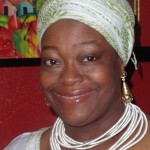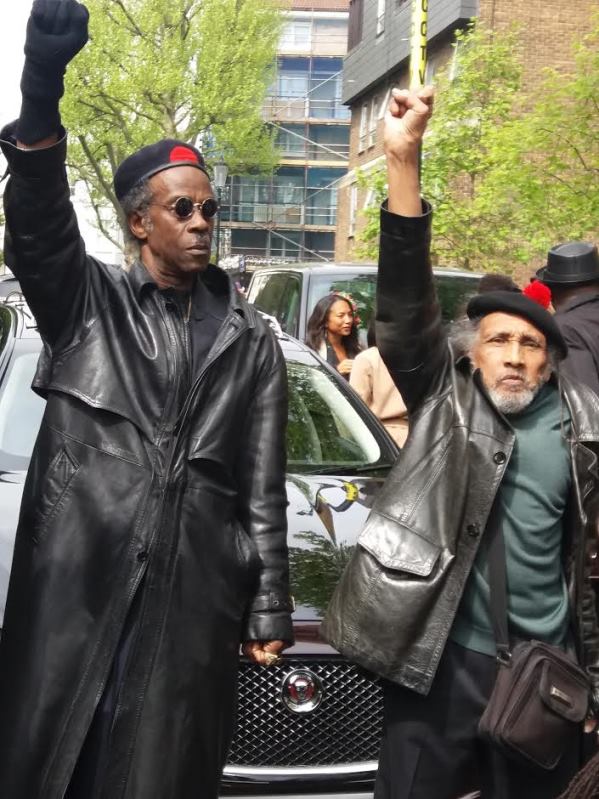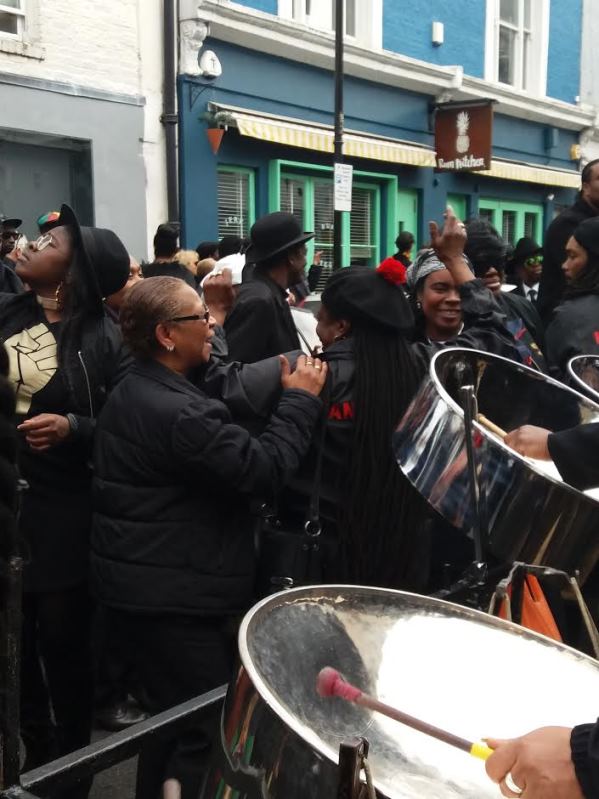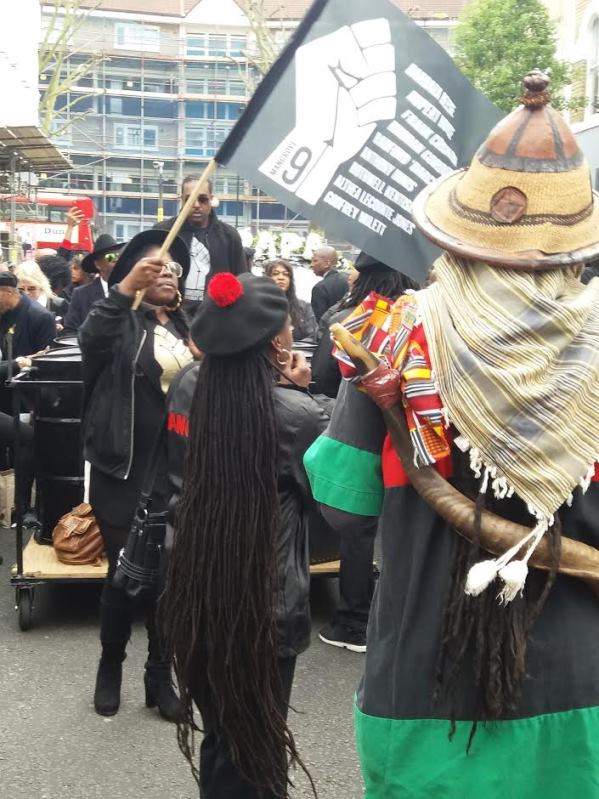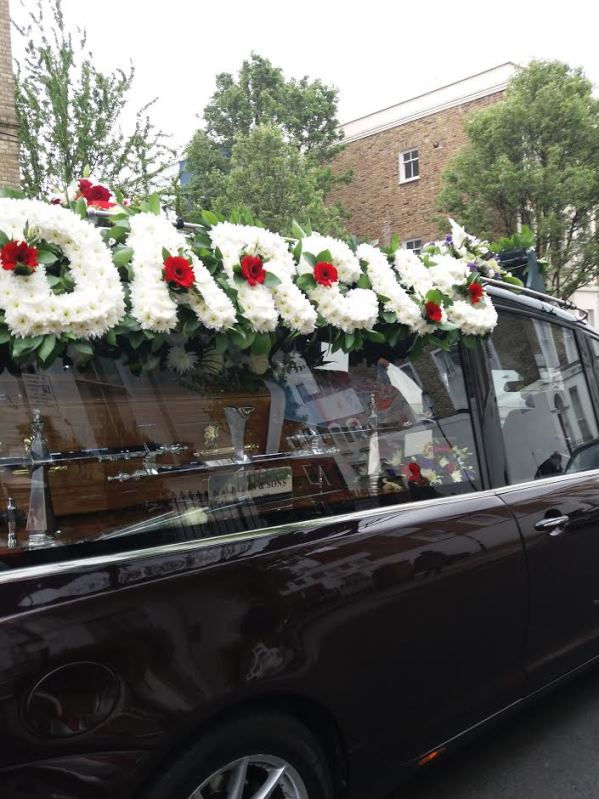The Tabernacle! I remembered it as a dance hall: the pre- carnival place to go and listen to the steel bands, dance to soca- calypso music and meet up with friends. I had not been there in more than thirty years, and although I knew the vicinity, I was not sure where it was I was going. I would have gotten lost too, were it not for an Afrikan brother who I stopped to ask directions and as it turned out, we were both going to the same place.
The only recognisable thing about the Tabernacle was the red building, everything inside had changed; everything had been sanitized and I could not recognise that old wooden floor on which I practiced my soca moves. Now, the hall seemed much smaller, less intimidating and very sombre. The five black covered tables were a sober reminder that we had gathered there to pay our respects to a great man. As the projector showed key moments of his life, emotions that ranged from sadness to gratitude swept over me. However, the more I thought about it, rather than feeling unhappy, I began to view the evening as a celebration of the life of Darcus Howe.
The music was well chosen by the DJ. One song, Free Man, by his friend, Linton Kwesi Johnson related the story about his release from Pentonville Prison in 1977, after his arrest and subsequent trial at Knightsbridge Crown Court… and the line: “If tomorrow were judgement day and I’m standing on the front line”, from Witney Houston’s My Love is Your Love, set the tone for reminiscing. The Front Line: “An area of potential or actual conflict or struggle; the most important or influential position in a debate or movement”, so the dictionary defines it. Yes! All Saints’ Road was that and so much more to the black community!
As the evening progressed, the uplifting tunes of steel pan music from his native Trinidad and Tobago provided a fitting remembrance. Later there was live music. Flautist, Keith Waite had flown back from Guyana two days previously, and despite jet lag, performed with his band. There was a minute’s silence and most of the 250 plus people, raised their arm in the black power salute.
I first met Darcus Howe at the Old Bailey, in December 1971. It was that last day of the trial in which he and four of his co-defendants (The Mangrove Nine) were acquitted of all 32 charges brought against them. The other four, were found guilty on 9 counts and received suspended sentences. In summing up, Judge Clarke officially acknowledged that there was racial hatred within the Metropolitan Police Force.
I remember sitting in the public gallery and hearing the shouts of jubilation from their supporters as the charges were dropped. It was a great victory for the local people and the beginning of my quest for knowledge of my history and identity.
Born to educator parents, Rhett Radford Leighton ”Darcus” Howe won a scholarship to Queen’s Royal College, the most prestigious secondary school in Trinidad at aged 10. In 1961, he left Trinidad to study law at London’s Middle Temple, which he did during the day, and at night he socialised in Notting Hill, a socially deprived area of London, where many West Indians had no choice but to settle during the early 1950’s. Many people from Trinidad, Barbados and Jamaica had settled there and the area became a hot bed for right wing and fascist groups, who wanted to ‘Keep Britain White’. The area was volatile as blacks and working-class whites competed for poor housing stock, which was often exploited by unscrupulous landlords. On top of that, casual racism barred black people from social activities, while institutionalised racism manifested itself in high unemployment, and the way the police harassed the local black community.
It was a protest against this sustained police harassment that saw Darcus Howe, Frank Critchlow and seven other defendants stand trial on 32 charges brought against them by the DPP. On 9 August 1970, one hundred and fifty people set off to march to various police stations in the area. They demanded the police “Get their hands off the Mangrove”, after the restaurant owned by Frank Critchlow, had been raided 12 times in six months. The police on each occasion claimed that the restaurant was a drugs den, despite never finding any evidence of drugs on the premises.
After the trial, Howe joined the British Black Panthers. During the trial he had worked closely with the Panther leadership and his conduct both inside and out of the court gained him a lot of respect with the Movement’s ordinary members.
Darcus Howe never forgot the people that were part of his life in Notting Hill and they never forgot him. People from all walks of life, the young and the old came to bid farewell to someone who in his own words said, “I am not a member of the Renegades, I am a Renegade.”
The funeral
Although I arrived an hour before the service was due to begin, there were only a few vacant seats in the 500 seating capacity of All Saints Church. Already there were people standing and many more were arriving, so I decided not to sit, but went outside to see what was happening. In true Afrikan tradition the D’jembe drummers arrived and were ushering in the celebration. In Mandinka tradition, the term “djembe” comes from the saying “Anke djé, anke bé” meaning “everyone gather together in peace.” Traditionally, the drums were only played by men; however there was a female drummer among the procession of six drummers; four of whom were dressed in Afrikan clothing. Later they were joined by a saxophonist, a scratcher and a flautist.
As Darcus Howe’s funeral cortege arrived, musician, Niles Hailstone, blew the kudu horn. This kind of instrument is played to summon the people in Afrikan tradition and he cut a dashing figure, dressed in a red, black and green tunic and Fulani straw hat.
As the male members of the family bore the coffin into the church, an imposing solitary figure, dressed in black, stood at the entrance and raised his gloved fist in the black power salute. Meanwhile, Niles Hailstone led the way into the church, drumming and chanting Darcus Howe’s name. Inside, the church was filled to its capacity of 850. Many more people were outside: talking, greeting long lost friends, taking photographs of the maroon coloured hearse with its large floral tributes saying: Papa, Darcus, and Renegade. There was a smaller wreath of white chrysanthemums and red carnations, made into the letter D, with a note from his widow.
After the funeral cortege left the church, it made its way down Portobello Road, up Westbourne Park Road and to the site of the Mangrove ( the heart of the black community in Ladbroke Grove for almost fifty years), on All Saints’ Road, where the celebrations really heated up. There, awaiting them were more crowds and the Mangrove Steel Band. A young woman dressed in black with a golden clenched fist on her tee shirt, carried the Mangrove 9 banner with the names of the Mangrove Nine: Barbara Beese, Radford “Darcus Howe”, Frank Critchlow, Rhodan Gordon, Anthony Innes, Althea Jones-Lecointe, Rothwell Kentish, Rupert Boyce, Godfrey Millet.
About thirty people wore black berets with a red pompom on the top. These are people who over the years were associated with the Mangrove. In cultural terms, black and red are Akan and Ashanti, traditional mourning colours. However, far from being a sombre occasion, the mood was happy and festive, again in keeping with the West Afrikan tradition of honouring the life of the deceased. The 300 or so people danced and were jovial as they walked the 2.3 km to the crematorium behind: the hearse, the drummers, the steel pans and other musicians. What normally would have been a thirty-four minute walk, took over two and a half hours as the procession walked up Ladbroke Grove and unto Harrow Road in a truly carnival type atmosphere.
Sometime during the walk, his children, grandchildren and other family members left their limousines and walked with the people who were celebrating the life of someone they dearly loved, an experience, I’m sure they will treasure for the rest of their lives! We arrived at the crematorium to be met by about 100 more people. There followed an emotional tribute by family members, including his grandson and brother.
The reception again was held at the Tabernacle and throughout the evening, hundreds more people came to pay their respects. I spent the evening listening to pockets of people discussing politics and cricket. Others were engrossed in conversations that touched things that ranged from racism, art, history and culture, to the concerns for the places they still called “home.” As I listened and engaged in some of those discussions, I reflected on the words of Darcus Howe, written on the back of the order of service:
“I see streets lined with hundreds of citizens, immersed in critical discussion. A thousand Platos in every neighbourhood. We will return to the art of discourse, not the jargon fuelled rhetoric of the modern day politician, designed solely to keep us disengaged and baffled. No. A genuine political vernacular accessible to all. The building blocks of a new form of localised, popular democracy premised on equality of ideas. We think, therefore we are.”



